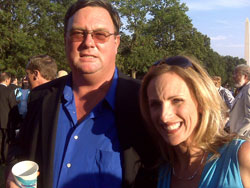
Glenn Koons and Actress Marlee Matlin
(4-8-21) From My Files Friday: It’s been nearly a decade since I posted this blog about one of the first and most inspiring peers I was fortunate enough to meet. His death made me wonder about how we treat peers. We expect them to be models of recovery. What happens if the symptoms of their illnesses surface? Are we there to support them?
Death Of An Advocate
First published September 2011
I first met Glenn Koons when I was invited to speak at a luncheon in Montgomery County, Pa., being hosted by the National Alliance on Mental Illness. It was one of the first speeches that I delivered after publication of CRAZY: A Father’s Search Through America’s Mental Health Madness and before my talk, veteran NAMI Board Member Carol Caruso introduced me to Glenn. I was immediately struck by his easy-going manner. Carol bragged that Glenn was one of the first NAMI trained Peer-to-Peer specialists in the entire nation. Glenn and I spoke for several minutes and I was impressed by his thoughtfulness and enthusiasm.
Our paths continued to cross during the coming years at various NAMI meetings and conventions. I was always happy to see Glenn and was thrilled when I learned that he had been one of only four NAMI peers who had been invited to the White House by President Obama to celebrate the 20th anniversary of the Americans with Disabilities Act of 1990.
A few weeks ago, I was asked to write an article for NAMI’s VOICES publication. In my article, I mentioned three “consumers” who have inspired me. They were Dr. Fred Frese, Diana Kern, and Glenn Koons.
The day after I submitted my article, an email arrived telling me that Glenn was dead.
According to an article published in the Berks County News, the police department in Sinking Spring, Pa., reported on July 26th that Glenn had disappeared. The police said there was no reason to suspect foul play and added that Glenn had not been taking his medication. He’d left his wallet, two cell phones, cash and his ID on his bed in his apartment and had vanished. The police and his concerned family asked for help in finding Glenn.
His body was found on August 31st by an electrical worker at the PPL Electrical Utilities substation outside of Sinking Spring. Details were not released, but he apparently had died from a fall off a rocky area. When I asked several mutual friends about Glenn’s death, they told me that he had suffered a relapse.
Glenn touched many of our lives and was an inspiration to those who knew him. You can read his obit at the end of this blog. It’s impressive.
Because Glenn was a high-profile peer specialist, his death came as a shock. Which brings me to the point of this blog. What happened? Did his medications stop working? Did he decide that he didn’t need them? One theory making the rounds was that Glenn was embarrassed to seek help because he was always cited as a successful example of someone who had recovered. He didn’t want anyone to think he had failed them when signs of his mental disorder began showing.
Those of us with loved ones, who have been diagnosed with mental disorders, know first-hand that these illnesses often are simmering under the surface. Relapses happen. Recovery is not something that is easily achieved. Nor are relapses something that anyone should be ashamed of.
As I said, I am not interested in morbid details. But what does interest me is how someone as well-respected, popular and as important as Glenn could end-up falling off a ledge. With all of his knowledge and connections, Glenn should have been able to get meaningful help.
He was well loved.
We will miss you Glenn.
Glenn’s obit.
Glenn Koons’ scholarship to help others.



